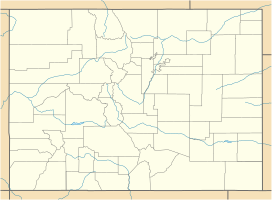Castle Peak (Colorado)
| Castle Peak | |
|---|---|

View from NNE above Montezuma Basin
|
|
| Highest point | |
| Elevation | 14,279 ft (4352.2 m) NAVD88 |
| Prominence | 2365 ft (721 m) |
| Isolation | 20.9 mi (33.6 km) |
| Listing | |
| Coordinates | 39°00′35″N 106°51′41″W / 39.0097375°N 106.8613598°WCoordinates: 39°00′35″N 106°51′41″W / 39.0097375°N 106.8613598°W |
| Geography | |
|
|
|
| Location | High point of both Gunnison and Pitkin counties, Colorado, U.S. |
| Parent range |
Highest summit of the Elk Mountains |
| Topo map |
USGS 7.5' topographic map Hayden Peak, Colorado |
| Climbing | |
| First ascent | 1873 by the Hayden Survey |
| Easiest route | Hike/scramble |
Castle Peak is the ninth highest summit of the Rocky Mountains of North America and the U.S. state of Colorado. The prominent 14,279-foot (4352.2 m) fourteener is the highest summit of the Elk Mountains and the Maroon Bells-Snowmass Wilderness. The peak is located 11.6 miles (18.7 km) northeast by north (bearing 32°) of the Town of Crested Butte, Colorado, United States, on the drainage divide separating Gunnison National Forest and Gunnison County from White River National Forest and Pitkin County. The summit of Castle Peak is the highest point of both counties.
Castle Peak takes its name from its castellated summit. The best climbing months are June, July, August, September through the Montezuma Glacier, a permanent snowfield between Castle and Conundrum Peaks. There are two standard routes for ascent. The Northwest Ridge features a moderate snow climb followed by an easy ridge scramble. It should not be attempted late in the summer when the 200 feet (60 m) of loose dirt and scree meet the climber near the top of the Castle-Conundrum saddle. The Northeast Ridge features an easy snow climb, but slightly harder scrambling and route-finding once on the ridge.
...
Wikipedia

